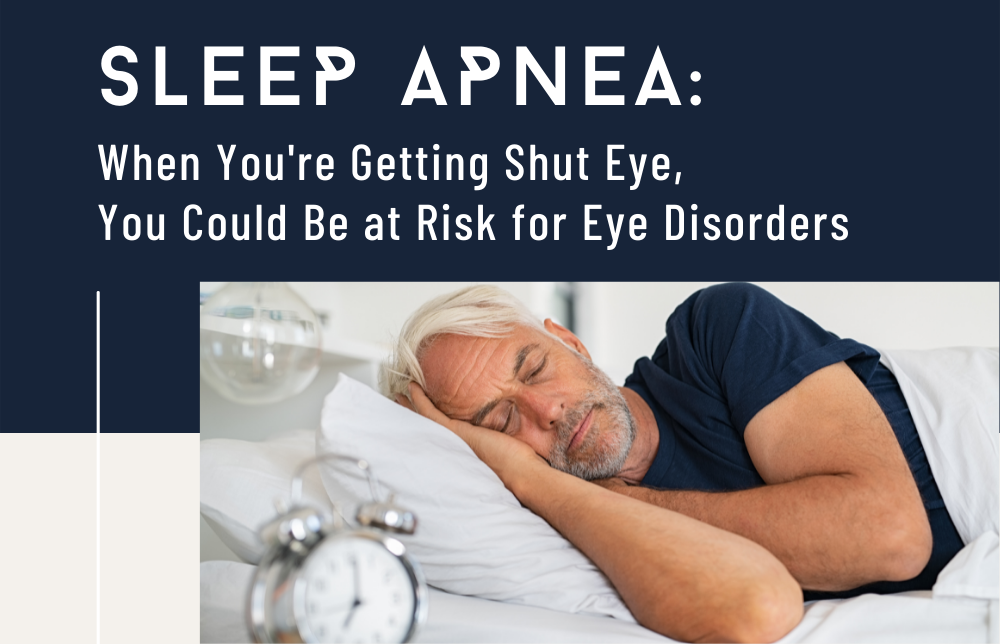
The Dangers of Sleep Apnea: When You’re Getting Shut Eye, You Could Be at Risk for Eye Disorders
May 24, 2022
Obstructive Sleep Apnea (OSA) is more than just a noisy nighttime annoyance. The most known symptom of the condition is loud snoring. But OSA also can narrow or close the airway in your throat, which momentarily will cut off breathing and lower blood oxygen levels.
Over time, this can have deleterious effects. Aside from not getting a good night’s rest and feeling physical and mental fatigue, OSA can cause complications like heart disease, arrhythmias, and stroke. But sleep apnea can also result in a number of eye disorders.
Sleep Apnea and Eye Disorder
When a person with sleep apnea stops breathing, the oxygen saturation in their blood drops. Once they start breathing again, the oxygen dramatically increases. This constant fluctuation can impact the pressure in the eyes and lead to inflammation and a host of health issues for the eyes.
Dry Eye Syndrome
Dry eye syndrome may not be considered a serious health condition, but it can have a significant impact on a person's quality of life.
Symptoms of dry eye syndrome include irritation, teariness, itching, and burning. Preservative-free artificial eye drops may be prescribed to help maintain moisture overnight.
Retinal Vein Occlusion
Retinal Vein Occlusion (RVO) is the second most common cause of blindness due to vascular disease in the retina. RVO is a blockage in the small veins that carry blood away from the retina. Estimates suggest that 37%–77% of people with RVO also have sleep apnea.
Research indicates that breathing interruptions from this disorder lead to hypoxia, increased intracranial pressure, and inflammation, which can thereby cause blockages in the small veins around the eyes.
Glaucoma
Not only is glaucoma more common in people with OSA, a recent study also linked the severity of sleep apnea with the severity of glaucoma.
People with glaucoma have high pressure in the eye, which can cause damage to the optic nerve. This results in loss of peripheral vision. Over time, the visual field gets smaller and smaller and can eventually lead to blindness. Sleep apnea leads to glaucoma through recurrent hypoxia (low oxygen) and oxidative stress, which damages the optic nerve.
Treating Sleep Apnea
Everyone should see an eye doctor for routine eye exams, but it’s especially important if you suffer from OSA. Your eye doctor can run tests, detect conditions, and help you treat them before symptoms emerge. The Vision Plan from INRTA and AMBA provides quality coverage with low copays for services you need, including a covered Well Vision exam every 12 months. Sign up now at https://ambainsurance.com/vision-inrta/ or call 866-979-0497.
Source: https://www.nature.com/articles/s41433-019-0430-2
https://www.aao.org/eyenet/article/obstructive-sleep-apnea-eye-ophthalmologist-s-role
RECENT POSTS
An Ambulance Trip Is Stressful: With MASA, the Cost Doesn’t Have to Be
People who require an emergency ambulance trip frequently ask the same question upon receiving the bill: “Why was the
Read More
AMBA’s Essential Insights in Dental Health: Understanding Cavities
Have you ever experienced pain or noticed persistent sensitivity in your teeth? You might have a cavity. Cavities are common,
Read More
Keep “Looking” Your Best: The Unique Eye Health Challenges for Women Over 55
March is Women’s History Month, a time to celebrate women's contributions to American history and society. It’s
Read More

Leaving Your Home To A Loved One
If you’re like many people, your home represents more than just financial value. As the saying goes, "Home is where the
Read More

